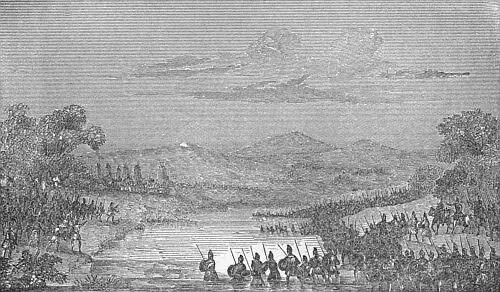Jacob Abbott - Hannibal
Здесь есть возможность читать онлайн «Jacob Abbott - Hannibal» — ознакомительный отрывок электронной книги совершенно бесплатно, а после прочтения отрывка купить полную версию. В некоторых случаях можно слушать аудио, скачать через торрент в формате fb2 и присутствует краткое содержание. Жанр: foreign_antique, foreign_prose, Историческая проза, на английском языке. Описание произведения, (предисловие) а так же отзывы посетителей доступны на портале библиотеки ЛибКат.
- Название:Hannibal
- Автор:
- Жанр:
- Год:неизвестен
- ISBN:нет данных
- Рейтинг книги:3 / 5. Голосов: 1
-
Избранное:Добавить в избранное
- Отзывы:
-
Ваша оценка:
- 60
- 1
- 2
- 3
- 4
- 5
Hannibal: краткое содержание, описание и аннотация
Предлагаем к чтению аннотацию, описание, краткое содержание или предисловие (зависит от того, что написал сам автор книги «Hannibal»). Если вы не нашли необходимую информацию о книге — напишите в комментариях, мы постараемся отыскать её.
Hannibal — читать онлайн ознакомительный отрывок
Ниже представлен текст книги, разбитый по страницам. Система сохранения места последней прочитанной страницы, позволяет с удобством читать онлайн бесплатно книгу «Hannibal», без необходимости каждый раз заново искать на чём Вы остановились. Поставьте закладку, и сможете в любой момент перейти на страницу, на которой закончили чтение.
Интервал:
Закладка:
The River Iberus.
His eager and restless desire to try his strength with the Romans received a new impulse by his finding that the power was now in his hands. Still the two countries were at peace. They were bound by solemn treaties to continue so. The River Iberus was the boundary which separated the dominions of the two nations from each other in Spain, the territory east of that boundary being under the Roman power, and that on the west under that of the Carthaginians; except that Saguntum, which was on the western side, was an ally of the Romans, and the Carthaginians were bound by the treaty to leave it independent and free.
Hannibal seeks a war with the Romans.
Hannibal could not, therefore, cross the Iberus or attack Saguntum without an open infraction of the treaty. He, however, immediately began to move toward Saguntum and to attack the nations in the immediate vicinity of it. If he wished to get into a war with the Romans, this was the proper way to promote it; for, by advancing thus into the immediate vicinity of the capital of their allies, there was great probability that disputes would arise which would sooner or later end in war.

The Battle in the River.
Stratagem of Hannibal.
Fording the river.
Great battle in the River Tagus.
Victory of Hannibal.
The Romans say that Hannibal was cunning and treacherous, and he certainly did display, on some occasions, a great degree of adroitness in his stratagems. In one instance in these preliminary wars he gained a victory over an immensely superior force in a very remarkable manner. He was returning from an inroad upon some of the northern provinces, laden and encumbered with spoil, when he learned that an immense army, consisting, it was said, of a hundred thousand men, were coming down upon his rear. There was a river at a short distance before him. Hannibal pressed on and crossed the river by a ford, the water being, perhaps, about three feet deep. He secreted a large body of cavalry near the bank of the stream, and pushed on with the main body of the army to some little distance from the river, so as to produce the impression upon his pursuers that he was pressing forward to make his escape. The enemy, thinking that they had no time to lose, poured down in great numbers into the stream from various points along the banks; and, as soon as they had reached the middle of the current, and were wading laboriously, half submerged, with their weapons held above their heads, so as to present as little resistance as possible to the water, the horsemen of Hannibal rushed in to meet and attack them. The horsemen had, of course, greatly the advantage; for, though their horses were in the water, they were themselves raised above it, and their limbs were free, while their enemies were half submerged, and, being encumbered by their arms and by one another, were nearly helpless. They were immediately thrown into complete confusion, and were overwhelmed and carried down by the current in great numbers. Some of them succeeded in landing below, on Hannibal's side; but, in the mean time, the main body of his army had returned, and was ready to receive them, and they were trampled under foot by the elephants, which it was the custom to employ, in those days, as a military force. As soon as the river was cleared, Hannibal marched his own army across it, and attacked what remained of the enemy on their own side. He gained a complete victory, which was so great and decisive that he secured by it possession of the whole country west of the Iberus, except Saguntum, and Saguntum itself began to be seriously alarmed.
Saguntum.
The Saguntines sent embassadors to Rome to ask the Romans to interpose and protect them from the dangers which threatened them. These embassadors made diligent efforts to reach Rome as soon as possible, but they were too late. On some pretext or other, Hannibal contrived to raise a dispute between the city and one of the neighboring tribes, and then, taking sides with the tribe, he advanced to attack the city. The Saguntines prepared for their defense, hoping soon to receive succors from Rome. They strengthened and fortified their walls, while Hannibal began to move forward great military engines for battering them down.
Hannibal attacks it.
Hannibal knew very well that by his hostilities against this city he was commencing a contest with Rome itself, as Rome must necessarily take part with her ally. In fact, there is no doubt that his design was to bring on a general war between the two great nations. He began with Saguntum for two reasons: first, it would not be safe for him to cross the Iberus, and advance into the Roman territory, leaving so wealthy and powerful a city in his rear; and then, in the second place, it was easier for him to find pretexts for getting indirectly into a quarrel with Saguntum, and throwing the odium of a declaration of war on Rome, than to persuade the Carthaginian state to renounce the peace and themselves commence hostilities. There was, as has been already stated, a very strong party at Carthage opposed to Hannibal, who would, of course, resist any measures tending to a war with Rome, for they would consider such a war as opening a vast field for gratifying Hannibal's ambition. The only way, therefore, was to provoke a war by aggressions on the Roman allies, to be justified by the best pretexts he could find.
Progress of the siege.
Hannibal wounded.
Hannibal recovers.
Saguntum was a very wealthy and powerful city. It was situated about a mile from the sea. The attack upon the place, and the defense of it by the inhabitants, went on for some time with great vigor. In these operations, Hannibal exposed himself to great danger. He approached, at one time, so near the wall, in superintending the arrangements of his soldiers and the planting of his engines, that a heavy javelin, thrown from the parapet, struck him on the thigh. It pierced the flesh, and inflicted so severe a wound that he fell immediately, and was borne away by the soldiers. It was several days before he was free from the danger incurred by the loss of blood and the fever which follows such a wound. During all this time his army were in a great state of excitement and anxiety, and suspended their active operations. As soon, however, as Hannibal was found to be decidedly convalescent, they resumed them again, and urged them onward with greater energy than before.
The falarica.
The weapons of warfare in those ancient days were entirely different from those which are now employed, and there was one, described by an ancient historian as used by the Saguntines at this siege, which might almost come under the modern denomination of fire-arms. It was called the falarica . It was a sort of javelin, consisting of a shaft of wood, with a long point of iron. This point was said to be three feet long. This javelin was to be thrown at the enemy either from the hand of the soldier or by an engine. The leading peculiarity of it was, however, that, near to the pointed end, there were wound around the wooden shaft long bands of tow , which were saturated with pitch and other combustibles, and this inflammable band was set on fire just before the javelin was thrown. As the missile flew on its way, the wind fanned the flames, and made them burn so fiercely, that when the javelin struck the shield of the soldier opposing it, it could not be pulled out, and the shield itself had to be thrown down and abandoned.
Arrival of the Roman embassadors.
While the inhabitants of Saguntum were vainly endeavoring to defend themselves against their terrible enemy by these and similar means, their embassadors, not knowing that the city had been attacked, had reached Rome, and had laid before the Roman senate their fears that the city would be attacked, unless they adopted vigorous and immediate measures to prevent it. The Romans resolved to send embassadors to Hannibal to demand of him what his intentions were, and to warn him against any acts of hostility against Saguntum. When these Roman embassadors arrived on the coast, near to Saguntum, they found that hostilities had commenced, and that the city was hotly besieged. They were at a loss to know what to do.
Читать дальшеИнтервал:
Закладка:
Похожие книги на «Hannibal»
Представляем Вашему вниманию похожие книги на «Hannibal» списком для выбора. Мы отобрали схожую по названию и смыслу литературу в надежде предоставить читателям больше вариантов отыскать новые, интересные, ещё непрочитанные произведения.
Обсуждение, отзывы о книге «Hannibal» и просто собственные мнения читателей. Оставьте ваши комментарии, напишите, что Вы думаете о произведении, его смысле или главных героях. Укажите что конкретно понравилось, а что нет, и почему Вы так считаете.












